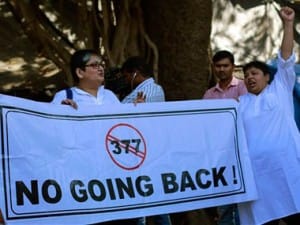Section 377of the Indian Penal Code (IPC) provides for punishment for up to 10 years or life and fine for “voluntarily having carnal intercourse against the order of nature with any man, woman or animal”. The explanation renders that penetration is sufficient to constitute the offence. The Section dates back to colonial times and is similar to laws introduced in many other British colonies. No similar prohibitions have been found to have existed in India before foreign rule.
According to an article in the Times of India (TOI), in July 2001, four staffers from a non-governmental organisation in Lucknow working to fight HIV/AIDS among men who have sex with men (MSM) were arrested and charged with the stringent IPC Section 377 and for sale obscene material among other offences. They were jailed for 47 days, their HIV/AIDS- related material seized and the offices of their NGOs – Naz Foundation and Bharosa Trust sealed. Health workers in Chennai, Bangalore and Delhi endured similar harassment, was noted Human Rights Watch in its publication “Epidemic of Abuse-Police Harassment of HIV/AIDS outreach workers”. For the LGBT (lesbian, gay, bisexual and transgender) communities earlier, criminalisation of their lives diminished their sense of self-worth, resulted in alienation from and lead to discrimination in all sectors of society, including employment.

In 2009, the Delhi High Court made a significant ruling in the Naz Foundation case, ending 150 years of criminalization and oppression. The court confirmed that the people of the LGBT community are equal citizens of this country and thus entitled to all the constitutional protections of equality, liberty, privacy, dignity and health. It declared in the Naz judgementthat adult consensual sex in private would not be covered by Section 377 IPC. Most importantly, the court conferred the rights of citizens to them. The Naz case in other words infused fundamental rights into the lives of the LGBT community.
By setting aside the Delhi High Court ruling earlier this week, the Supreme Court has snatched away from the LGBT community all these fundamental rights. Activists have called this a ‘black day’ in the history of India’s judiciary and compared it to the emergency.
What will be the impact of the Supreme Court’s verdict on Section 377 on India’s battle against HIV/AIDS — when criminality is attached to vulnerable communities?
“It will have a devastating impact on the fight against HIV/AIDS. In the early days it was very hard to get MSMs to health units as they feared police action. This changed only after the Delhi HC judgement,” says Dr. L Ramakrishnan of Solidarity and Action Against the HIV Infection in India. The National AIDS Control Organization too had admitted in its affidavit that Section 377 acted as a “serious impediment” to successful public health interventions.
- Gay persons would be afraid to approach health care systems as they could be reported under Section 377.
- The judgment would make health care workers who work with LGBT communities vulnerable to police harassment for ‘promoting’ illegality.
- Social stigma could force MSMs to deny their sexual behaviour, marry women and have sex with female partners putting them at the risk of HIV/AIDS.
- As mentioned in the TOI article, roughly seven per cent of the estimated 25 lakh gay persons in India are HIV-infected (according to the Central government). Their marginalisation in healthcare was in fact the basis of the Public Interest Litigation filed by the Naz Foundation in the Delhi HC.
- Persons in the LGBT community after the HC ruling had started to come out and lead normal lives. The Supreme Court verdict has reversed all that. The Supreme Court has actually told the LGBT community that they are not entitled to fundamental rights — they are second-class citizens; they cannot exercise freedom expressing the core of their personality.
There is an interview of Anjali Gopalan from the Naz Foundation , in which she has mentioned that moving forward they would like to file a review petition and see how that goes and then look at a curative petition.

